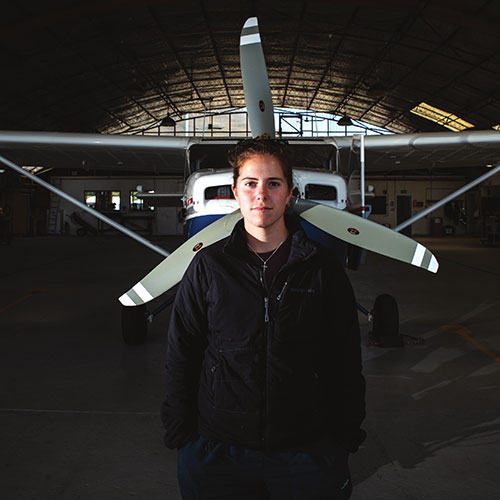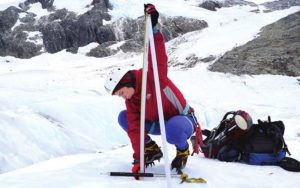
Lauren Vargo ’13 studies connections between glacier melt and climate change

Lauren Vargo ’13 came to The College of Wooster because she wanted the chance to take a wide variety of classes to figure out what she wanted to study. When a friend suggested that she take an environmental geology class, she became fascinated by the subject, declaring a major in geology and minor in environmental studies. Now, 10 years later, she has a Ph.D. from Victoria University of Wellington in New Zealand and is working as a postdoctoral fellow in the university’s Antarctic Research Centre studying glaciers and climate change.
Vargo first became interested in glaciers as a student at Wooster, working on research with Schoolroy Chair of Natural Resources Greg Wiles. The summer before her senior year, Vargo traveled to Glacier Bay National Park in Alaska with Wiles to study glaciers. Vargo loved that the small size of the geology department allowed her to have hands-on research opportunities and form close relationships with students and professors. “Going in the field and going on field trips gives you the opportunity to bond with students but also get to know the professors a bit better,” she said.
The department also has multiple female professors, which made an impact on Vargo as a young woman interested in science. “It was a big thing for me when I was there that two of the four geology professors were women,” Vargo said. “I’ve definitely worked in places since then where that’s not even close to the gender breakdown. Coming into the field and not seeing that bias was really nice.”
Vargo is trying to change that status quo by establishing a New Zealand branch of a program called Girls on Ice, which takes teenage girls on expeditions to glaciers and teaches them science, art, and outdoor skills. “One of the goals is to get more women into science,” Vargo said. “But we know that not all of them are going to go and become scientists, so the program shows all of them that science is something that is accessible to them and can be part of their daily lives.”
Vargo did her Independent Study research with Wiles, using data from Wooster’s tree ring lab to study how volcanic eruptions and long-term shifts in climate appear in tree ring records. She learned research techniques that she still uses today. “The junior and senior I.S. projects and the research with Dr. Wiles taught me how to ask questions about how things work, why things are changing, and how to better understand those questions,” she said.
Because she enjoyed doing research for I.S. so much, Vargo decided to go to graduate school at the University of New Mexico for a master’s in science. It was afterwards, while working at the Los Alamos National Lab, that she confirmed that she wanted to stay in the field of research and learned about the Ph.D. program in the Antarctic Research Centre. She applied and got in. “I thought I would come for just my Ph.D. for three or four years, but I’ve stayed since then,” she said.

Vargo measures glacier mass change on Brewster Glacier in 2018. Photo: Brian Anderson, provided by Vargo
As a postdoctoral research fellow at the university, Vargo focuses on monitoring how glaciers in New Zealand are changing. While New Zealand doesn’t have nearly as many glaciers as other regions such as Alaska, Vargo said that they are still very important to study for multiple reasons. One is due to their impact on local water resources. “As the glaciers melt, they provide an input of water in the spring and summer. Once they start to melt more, there is more water for a few years, but then they lose enough ice that there is actually less water,” Vargo said. She also explained that glaciers are an important tourist destination for the country, as well as culturally significant to the people indigenous to New Zealand. Part of Vargo’s job is doing outreach with Indigenous communities who live near the glaciers and run helicopter tours, providing them with up-to-date science and helping to promote tourism.
She recently received a grant from the Marsden Fund to design a three-year project that expands the work she did during her Ph.D. to examine how much of the melt of New Zealand’s glaciers is due to climate change. Her new project will study the melt of glaciers all across the world. “One of the things I’m especially interested in is how we can use the results to talk about climate change. I’d love to hopefully have it lead into more work with social scientists and science communicators to present these results,” Vargo said.
Photo 1: Vargo prepares for a flight to take photographs of New Zealand glaciers in March 2020. Photo by Rebekah Parsons-King.
This feature originally appeared in the spring 2023 edition of Wooster magazine.
Posted in Alumni, Magazine on March 15, 2023.
Related Posts
Related Areas of Study
Environmental Studies
Natural sciences, social sciences, and humanities courses combine for those who want to be part of environmental solutions
Major MinorGeology
Start research in your first year and graduate with a strong foundation in the Earth Sciences.
Major MinorEnvironmental Geoscience
Investigate the impact humans have on the Earth and research ways to solve pressing environmental problems.
Major Minor

